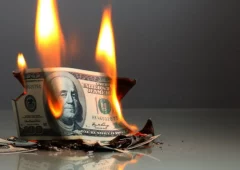Analyst Cautions About Risks from Trump’s Economic Plans
23.07.2024 12:00 1 min. read Alexander Stefanov
Cryptocurrency analyst Noelle Acheson cautions that despite former President Donald Trump’s supportive stance on digital assets, his economic policies could negatively impact the crypto market.
Acheson highlights that Trump’s policies, including tax cuts, tariffs, and a push for a weaker dollar, could lead to higher inflation, which might counteract the typical advantages cryptocurrencies enjoy in low inflation and interest rate environments.
Republican proposals like tax cuts and tariffs often result in increased inflation, according to Acheson. Tax cuts can boost consumer spending, driving up demand and prices, while tariffs raise the cost of imported goods, which gets passed on to consumers, further fueling inflation.
A weaker dollar, another aspect of Trump’s economic strategy, has mixed effects on the crypto market. While it might make U.S. exports more competitive, it also raises import prices, contributing to inflation. This inflationary pressure could negate the benefits of a weaker dollar for the crypto market, which thrives on lower inflation and interest rates.
Despite these challenges, Acheson notes a potential upside: in times of currency instability, a weaker dollar could enhance the appeal of cryptocurrencies as a decentralized alternative asset. However, this potential benefit might not fully offset the risks associated with higher inflation.
-
1
Trump Imposes 50% Tariff on Brazil: Political Tensions and Censorship at the Center
10.07.2025 7:00 2 min. read -
2
Key Crypto Events to Watch in the Next Months
20.07.2025 22:00 2 min. read -
3
USA Imposes Tariffs on Multiple Countries: How the Crypto Market Could React
08.07.2025 8:30 2 min. read -
4
UAE Regulators Dismiss Toncoin Residency Rumors
07.07.2025 11:12 2 min. read -
5
Ripple Selects BNY Mellon as Custodian for RLUSD Stablecoin Reserves
09.07.2025 15:28 2 min. read
Two Upcoming Decisions Could Shake Crypto Markets This Week
The final days of July could bring critical developments that reshape investor sentiment and influence the next leg of the crypto market’s trend.
Winklevoss Slams JPMorgan for Blocking Gemini’s Banking Access
Tyler Winklevoss, co-founder of crypto exchange Gemini, has accused JPMorgan of retaliating against the platform by freezing its effort to restore banking services.
Robert Kiyosaki Warns: ETFs Aren’t The Real Thing
Renowned author and financial educator Robert Kiyosaki has issued a word of caution to everyday investors relying too heavily on exchange-traded funds (ETFs).
Bitwise CIO: The Four-Year Crypto Cycle is Breaking Down
The classic four-year crypto market cycle—long driven by Bitcoin halvings and boom-bust investor behavior—is losing relevance, according to Bitwise CIO Matt Hougan.
-
1
Trump Imposes 50% Tariff on Brazil: Political Tensions and Censorship at the Center
10.07.2025 7:00 2 min. read -
2
Key Crypto Events to Watch in the Next Months
20.07.2025 22:00 2 min. read -
3
USA Imposes Tariffs on Multiple Countries: How the Crypto Market Could React
08.07.2025 8:30 2 min. read -
4
UAE Regulators Dismiss Toncoin Residency Rumors
07.07.2025 11:12 2 min. read -
5
Ripple Selects BNY Mellon as Custodian for RLUSD Stablecoin Reserves
09.07.2025 15:28 2 min. read


